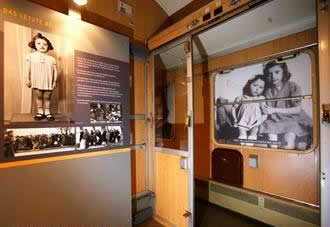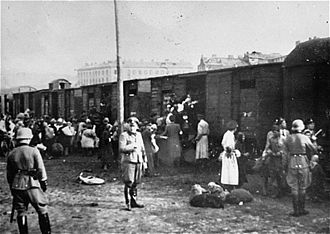Democrat July-Agust 2013 (Number 136)
Deutsche Bahn impedes commemoration train - of tranposrting Jews to Nazi camps
Horst Teubert - German Foreign Policy Group

While people in Britain are commemorating the rescue of around 10,000 mostly Jewish
children from Nazi Germany by the so called Kindertransport, another sort of transport - a
barbarian one - is still provoking disputes in Germany: the deportation of millions of people
to Nazi death camps. The deportations were mainly carried out by the biggest transport
company in Nazi Germany, Deutsche Reichsbahn, the predecessor of Deutsche Bahn.
"Deutsche Reichsbahn deported three million people directly to death camps like Auschwitz
where they were murdered. It deported at least eleven million people to other Nazi camps
and places where they had to do forced labour", says Hans-Rüdiger Minow, chairman of a
German citizens' initiative which runs the "Train of Commemoration".
"Train of Commemoration" is a kind of rolling exhibition. It is a real train, comprising a
steam locomotive and several railroad cars showing an exhibition about the fate of children
and youth from all over Europe who were deported by the Nazis. The young people were
brutally cooped up in totally overcrowded cattle waggons without food and drink, then the
trains departed on a often several days long journey to the Nazi camps. The deportation
trains crossed regular railway stations or took a halt there, so it was nearly impossible to
ignore them. A few children even succeeded in throwing farewell letters from the trains or
in desperately calling for help, but this didn't seem to move the non Jewish German
population.
The "Train of Commemoration" first started in 2007 to commemorate the fate of the more
than a million deported young people. Until today, it has stopped at about 150 railway
stations; nearly half a million visitors have paid tribute to the victims. In 2010, the EU
commission granted the citizens' initiative which runs the train an award to for its "active
civic engagement". The citizens' initiative has asked Deutsche Bahn for support since the
beginning of its activities - but in vain. Whereas the French state-owned SNCF and the
Polish PKP railroad companies have supported the "Train of Commemoration", Deutsche
Bahn imposes a fee of about 5 euros (£4.2) per kilometre and another one of about 500
euros (£420) for daylong stopovers at the railway stations where the train opens for visitors.
Until today, this amounts to approximately 250,000 euros (£212,000).
 Behind this dispute about the "Train of Commemoration" with its exhibition, there is
another point at issue - an even more serious one. To date, Deutsche Bahn has not paid any
real damages to the victims. Neither have they been refunded the travel fare Deutsche
Reichsbahn charged them for the deportation. Indeed, every deported person had to pay for
his or her "trip" as they would have done on a normal journey; the fares were four German
Reichspfennig per kilometre for an adult and two for children. The "Train of
Commemoration" citizens' initiative has published an expert report which concludes that
Deutsche Reichsbahn earned at least 445 million euros in today's currency (£377 million)
from the deportation business, less interest. With interest, this could amount to more than
two billion euros (£1.7 billion). This is only what can be calculated from the remaining
deportation lists which are definitely incomplete.
Behind this dispute about the "Train of Commemoration" with its exhibition, there is
another point at issue - an even more serious one. To date, Deutsche Bahn has not paid any
real damages to the victims. Neither have they been refunded the travel fare Deutsche
Reichsbahn charged them for the deportation. Indeed, every deported person had to pay for
his or her "trip" as they would have done on a normal journey; the fares were four German
Reichspfennig per kilometre for an adult and two for children. The "Train of
Commemoration" citizens' initiative has published an expert report which concludes that
Deutsche Reichsbahn earned at least 445 million euros in today's currency (£377 million)
from the deportation business, less interest. With interest, this could amount to more than
two billion euros (£1.7 billion). This is only what can be calculated from the remaining
deportation lists which are definitely incomplete.
"Deutsche Bahn has at least to pay this money back", says Hans-Rüdiger Minow, chairman
of the citizens' initiative. "These were crimes against humanity which do not fall under the
statute of limitation." After strong protests in 2010, Deutsche Bahn announced that it would
pay five million euros (£4.2 million) to the Stiftung "Erinnerung, Verantwortung und
Zukunft" (Foundation "Remembrance, Responsibility and Future") which supports historical
memory and Nazi victims. The Foundation was to use this money for humanitarian purposes
in Eastern Europe - at exactly a time when Deutsche Bahn was planning its expansion to
Poland. A TV commentator called this a cheap PR measure and reported on bitter
complaints by formerly deported people in Eastern Europe that the German company still
denied them any real compensation. This hasn't changed until today.